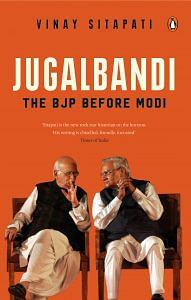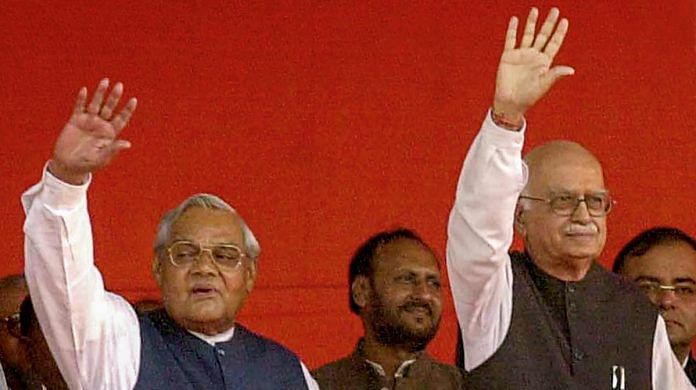Vajpayee and Advani’s decision to form a new party rather than renounce the RSS bought them its gratitude. The 13 April 1980 editorial of the Organiser claimed, ‘Although many would like to give the old Jana Sangh name to the new party, it was but appropriate that the new party should get a new name . . . there are significant new elements which can only broaden its base.’
While Vajpayee had shown a warm heart by staying loyal to the RSS, he was simultaneously cold-blooded in denuding the new party of any remaining competition. He met RSS chief Balasaheb Deoras and said, ‘It’s either [Subramanian] Swamy or me in the new party.’ R.V. Pandit says ‘Atalji did a slight injustice to Swamy. He was cleverer than Atalji. And he tried to show-off. Whereas Atal and Advaniji are not show-offs at all.’
Pandit’s comments echo the condemnation that Hindu nationalism faces for being hostile to intellectuals. While some hold that a shallow ideology cannot attract brain power, the more likely answer is that brilliant people tend to have outsized egos—as Subramanian Swamy, Balraj Madhok and M.L. Sondhi all had. An ideology that places teambuilding above all else is unsuited to solo performers.
Also read: How is Modi’s BJP different from the one founded by Advani-Vajpayee 40 years ago?
The one man Vajpayee found hard to expunge was Nanaji Deshmukh. The co-founder of the Jana Sangh was older than Vajpayee, and perhaps the only man remaining in the party who could call him ‘Atal’ without the honorific ‘ji’ at the end. But Nanaji was by now disillusioned with the way the Janata Party had put ambition before principle. Equally, he resented how methodically Vajpayee had demoted him. Nanaji could have made a public scene, as was standard in other parties. Instead, he announced his retirement from politics, claiming that he had turned sixty and wanted to set an example.
Nanaji decided to move to Chitrakoot, a forested area in central India, and work with tribals. Such a move typified Mohandas Gandhi’s idiom of social change, illustrated by his ‘ashrams’ in South Africa, Ahmedabad and Wardha. For all the RSS’s fury at Gandhi in the lead-up to partition, their glorification of village life was quite similar.
There was also symbolism in the location of Chitrakoot, given that in the Ramayana, it was in these forests that Ram, his brother Lakshman and wife Sita spent a part of their fourteen-year ‘vanvaas’ or banishment from the throne. It was here in Chitrakoot that Nanaji chose to spend his own ‘vanvaas’.
With this exit, the final competitor to Vajpayee and Advani’s partnership had been subdued. And with the RSS still grateful, they were now entirely free to decide what their new party would stand for.
Also read: Vajpayee-Advani to Modi-Shah: This was India’s decade of political power duos
Jugalbandis are concerts where two musicians perform together in a way in which it is not clear who the main performer is, who the accompanist. After decades in which Advani was subordinate to Vajpayee, by 1980 their relationship had become more equal. While Advani had always needed Vajpayee, he was now as needed. They were now a classical jugalbandi.
This was why, in thinking about what the new BJP should stand for, Vajpayee made sure that Advani was as involved in drawing lessons from the failed Janata experiment. Reflecting together, they came to the conclusion that the Janata government had articulated a distinct ideology of civil liberties, socialism and decentralization. And both of them believed that Indian voters were more receptive to this than to Hindutva. What voters had rejected in the 1980 elections was not JP’s ideological inheritance; it was his squabbling executors.
The new-fangled Bharatiya Janata Party, Vajpayee and Advani concluded, would need to couple Hindu nationalist discipline with the policies of Jayaprakash Narayan. It would also have to keep the RSS at arm’s length. Crafting such a ‘moderate’ party required nimble footwork by Vajpayee and Advani. But they both had long become adept at working together to balance parliament, party, movement and voters. They were now confident they could do it again. Or so they thought.
 This excerpt from Vinay Sitapati’s book ‘Jugalbandi: The BJP before Modi’ has been published with permission of Penguin Random House India. Viking I Rs. 799 I 424pp
This excerpt from Vinay Sitapati’s book ‘Jugalbandi: The BJP before Modi’ has been published with permission of Penguin Random House India. Viking I Rs. 799 I 424pp




When Vajpayee and Advani were leaders, the appeasers were saying it was a communal party, why are they singing a different tune?
They should not be singing a different tune. I always said Advani and Vajpayee were communal Hindu fascists. It is now with Modi and Shah, that is with even more complete Hindu extremists, in power, people look back and think Vajpayee-Advani were moderate. Any moderation was due to not having a majority. Advani started Hindu mob politics in the 1990s, and India has progressively degenerated.
Idiotic comment by an idiot.Don’ compare vajpayee’s bjp with Modi’s BJP. It is like comparison between heaven and hell.
Better comparison with current bjp is with Communal Jinnah’s Muslim league.
One would not place PM ABV and Dr Swamy in the same orbit. For that matter, although Mr Advani made a contribution to building up the party, he was never in Vajpayeeji’s class. Such greatness is visited upon a party very rarely. Future historians, who have the luxury of telescoping time, might find a Jugalbandi between Pandit Nehru and Shri Vajpayee.